Shopify vs Shopware : Which Platform to Choose for Your Store
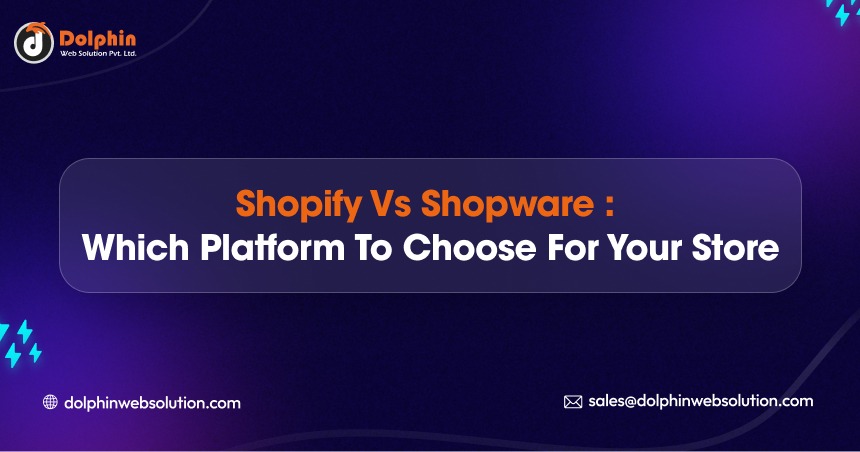
Table of Contents
Summary :
Shopify and Shopware are two of the most popular e-commerce platforms used worldwide for developing online stores and powering digital business. While Shopify offers a simpler approach suitable for entry-level merchants, Shopware provides more flexibility and customization capabilities for advanced users. This guide provides an in-depth comparison between Shopify and Shopware in terms of features, advantages, disadvantages, key differences, and development costs to help businesses choose the right platform for their needs.
In the ecommerce industry, new technology and frameworks are increasing daily, so you must choose a suitable ecommerce platform for your store, whether it is Magento, Shopify, Wocomerce, Shopware, or any other. So, in this latest article, we will discuss Which framework you should choose for your commerce store: Shopify or Shopware? Let’s dive in.
What is Shopware?
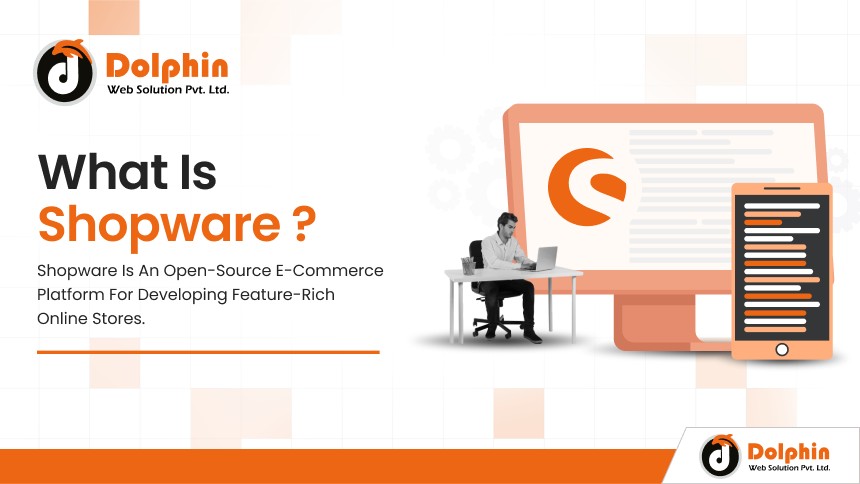
Shopware is an open-source e-commerce platform for developing feature-rich online stores. Powered by a loyal community of over 100,000 stores globally, Shopware offers merchants robust functionalities and endless opportunities for customizations and integrations. With its latest version – Shopware 6, the platform aims to provide developers with greater flexibility through an API-first approach and headless concepts. This is why the demand for Shopware 5 to 6 migration is getting higher.
Key Features of Shopware
Below are the essential features that you get with Shopware development for your platform:
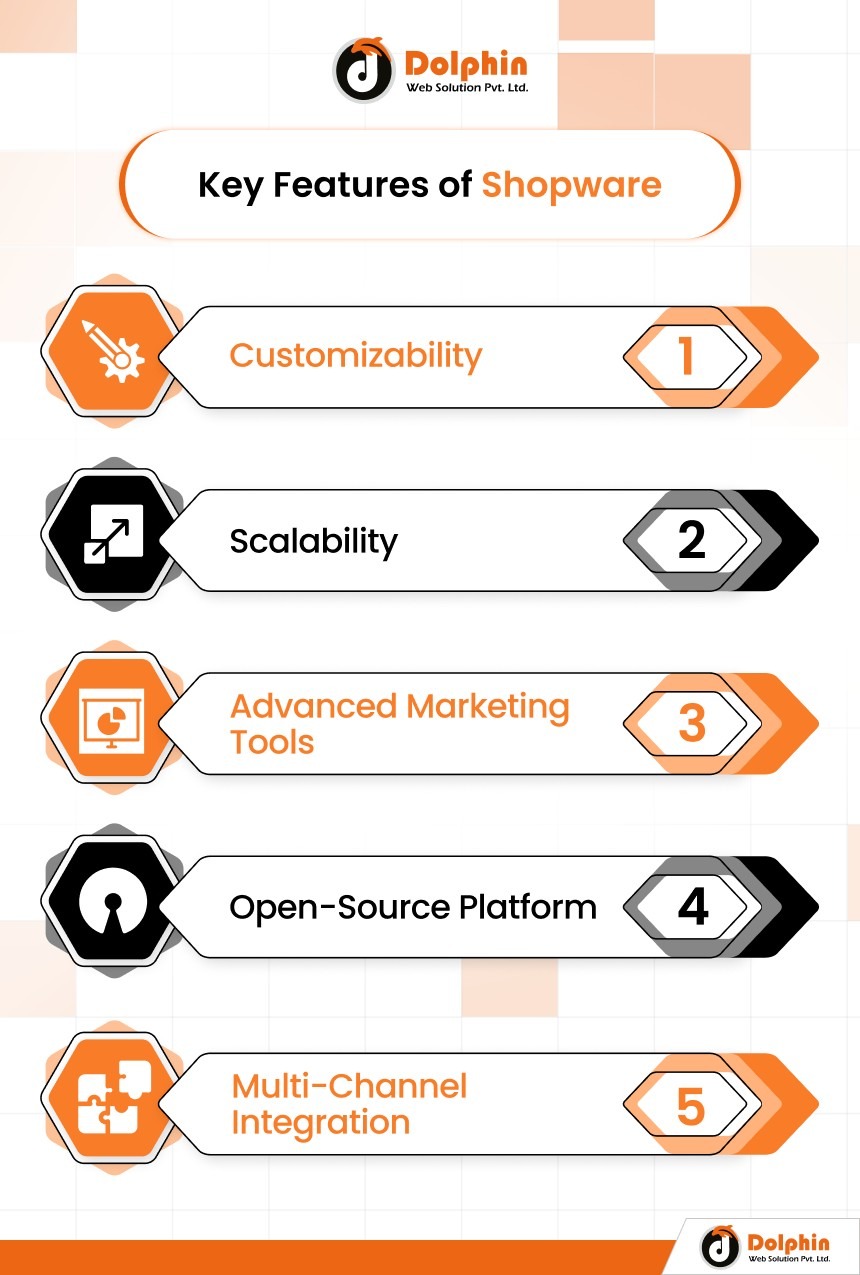
- Customizability: Shopware is highly customizable and extensible via plugins and custom code. Developers can modify and adapt it according to the merchant’s requirements. This makes stores built on Shopware future-proof.
- Scalability: Shopware can scale according to business needs through its multi-tenant structure and clustering capabilities. It ensures smooth performance for stores with high volumes of traffic and orders.
- Advanced Marketing Tools: Features like SEO optimization, social media integration, personalized shopping experience, loyalty programs, etc., help drive sales.
- Open-Source Platform: Being open-source provides transparency and opportunities to contribute to the developer community.
- Multi-Channel Integration: Shopware seamlessly syncs orders and inventory across all sales channels like online stores, marketplaces, and offline points of sale.
Advantages of Shopware
Take a look at the advantages that come along with Shopware:
- Open-source and highly customizable: Shopware gives developers full control over store designs, functionality, and data handling based on business needs.
- Scalable: Its cluster-ready architecture and extensive plugins make Shopware scalable for store volumes from small to enterprise-level.
- Robust feature set and plugin ecosystem: From inventory to analytics to marketing, Shopware has all the tools needed to run an online business, and more can be added via rich plugin marketplaces.
- Strong community support: An active community of Shopware professionals provides helpful resources and assistance on the forums.
Disadvantages Of Shopware
There are a few disadvantages as well that you must keep in mind while using the respective platform:
- The steep learning curve, especially for non-technical users: Understanding and utilizing Shopware’s full potential requires extensive technical knowledge.
- Costs for customization and development: Hiring skilled Shopware developers and implementing complex custom features may get expensive compared to out-of-box solutions.
- Limited built-in design templates and themes: Stores mostly require ground-up frontend development for custom designs, unlike Shopify’s premade theme store.
- Limited Customer Support: Shopware focuses more on community support than direct customer assistance, especially for non-paid plans and packages.
What is Shopify?
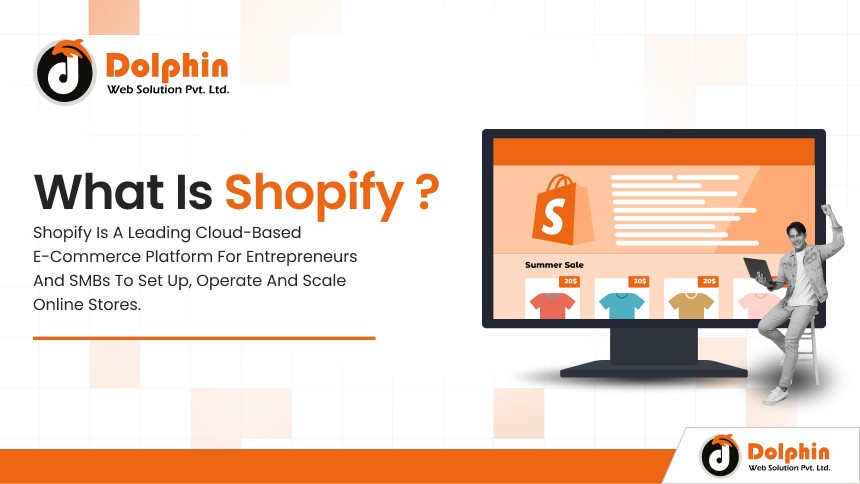
Shopify is a leading cloud-based e-commerce platform for entrepreneurs and SMBs to set up, operate, and scale online stores across multiple sales channels swiftly. With Shopify development, merchants can tap into built-in features, robust merchant services, trusted commerce experiences, and scalable infrastructure to build, manage, and grow their commerce businesses successfully.
Key Features Of Shopify
Below are the essential features that you get with Shopify for your platform:
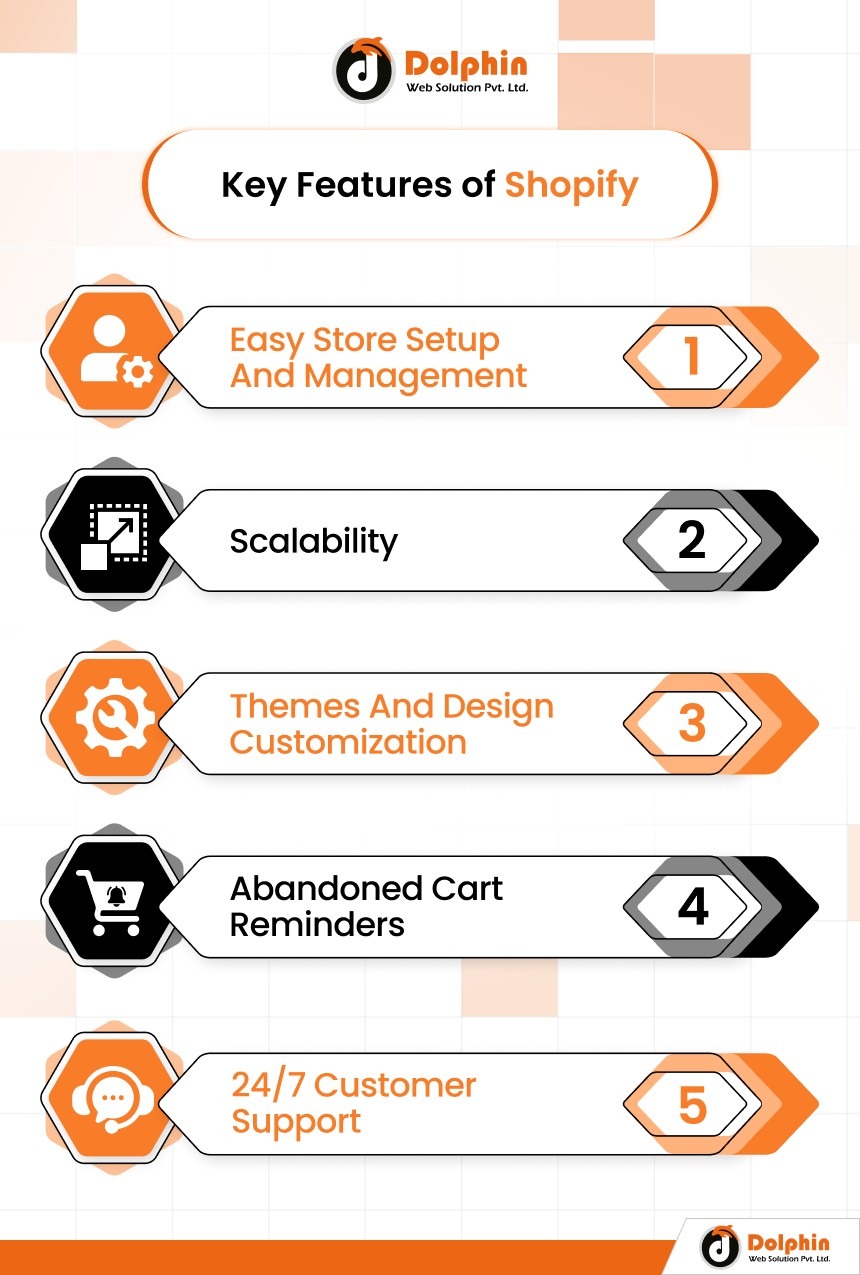
- Easy Store Setup and Management: Shopify offers a simple drag-and-drop interface and admin panel for creating online stores within minutes without coding.
- Scalability: It scales according to traffic and orders through Shopify’s robust cloud infrastructure and server architecture.
- Themes and Design Customization: Merchants get access to hundreds of customizable store themes in the Shopify theme store.
- Abandoned Cart Reminders: Merchants can automatically reconnect with cart abandoners through email campaigns.
- 24/7 Customer Support: Shopify provides direct multilingual support for issues regarding store management, sales, and operations.
Advantages of Shopify
Take a look at the advantages that come along with Shopify:
- User-friendly and easy to set up: Shopify is very beginner-friendly with its simple interface and pre-built features that make it ideal for non-technical founders.
- A wide range of themes and apps are available: Merchants can customize stores visually and functionally from numerous free and paid assets available in the theme and apps sections.
- Robust built-in features: Features like shipping, taxes, reporting, inventory, and security are deeply integrated for smooth operations.
- Excellent security services: Shopify provides security at physical and software infrastructure levels via monitoring, DDoS protection, etc.
Disadvantages of Shopify
There are a few disadvantages as well that you must keep in consideration while using Shopify:
- Limited customization: While themes allow visual tweaks, integrating complex personalizations requires third-party developer assistance.
- Higher transaction fees compared to Shopware: Shopify charges extra on transactions in addition to the monthly subscription fees.
- Monthly subscription costs: Shopware is free to use, whereas Shopify makes recurring subscription payments.
Shopware vs Shopify: The Major Difference
To make it clearer, below, we dig in and check the differences between the two in a much more exquisite manner.
1. Ease of Use and Setup
Shopify provides a quicker and simpler way for beginners to launch an online store. It offers a range of pre-built themes and design layouts that can be customized through its user-friendly admin dashboard without coding. New store owners can pick a theme, add products, and go live within just a few hours.
On the other hand, setting up Shopware requires more technical configuration. Users need to install and configure the core software before building out the storefront. They also need to integrate themes and extend functionalities through plugins, which involves development expertise. While flexible, the learning curve is steeper upfront for non-technical users.
Shopify also has ready-made apps and functionalities integrated into its platform, such as mail marketing, inventory tracking, etc. Shopware’s out-of-the-box features are more limited and require additional plugins. This makes the Shopify initial setup relatively simpler for beginners compared to Shopware’s custom development requirements.
2. Customization and Extensibility
Though Shopify provides design customizations through themes, they come with limitations on modifications to core elements and codes. Changes require developer assistance and a separate local development environment.
In contrast, Shopware opens up complete access to the codebase, allowing flexible adjustments and full custom development. Administrators can modify core functionalities, data models, and internal workings to desired specifications. Extensions are also seamless through well-documented APIs and CLI tools.
Moreover, Shopware’s extensive plugin architecture delivers virtually unlimited extensibility. Developers can build a myriad of integrations and functionalities limited only by imagination. New features are smoothly integrated without touching core codes. This suits complex bespoke requirements of medium to large-sized enterprises.
3. Product Catalog Management
Both platforms provide rich catalog management systems to set up products, categories, attributes, pricing, etc. However, Shopware’s backend is designed for advanced capabilities required by B2B selling. It supports extensive attributes, characteristics, file uploads, variants, bundles, SKU based inventory tracking suited for complex catalogs.
Shopify product pages are easier to set up but attributes are more rigid without custom fields. Shopware offers dynamic catalog structures configurable through plugins. Its robust APIs also facilitate integrating with external PIM systems for synchronized multi-channel selling. Overall, product data handling abilities are better developed for scalable operations and complex product ranges on Shopware.
4. Order Management
Basic order processing, payment and invoices are available out of the box on both platforms. However, Shopify order management is pre-built, while Shopware requires integration and customization effort initially.
Shopify simplifies the creation of orders, tracking fulfillment status, refunds, and exchanges directly through its intuitive interface. Shopware order functionality needs to be extended depending on specific workflows through plugins or custom development. This allows more flexibility but involves upfront costs.
Major e-commerce service providers like shippers, marketplaces etc offer ready plugins on Shopware easing integration. However specialized requirements may demand code-level customization by developers or partner agencies on both platforms to streamline ordering for different business models.
5. Reporting and Analytics
Both Shopware and Shopify include basic web analytics and reports on metrics like traffic, conversions, best-selling products etc. However, Shopware reporting capabilities are more extensive to analyze diverse KPIs for optimized operations and marketing strategies.
Its high coverage of detailed sales data facilitates a custom report builder for CSV exports and API access. Shopware reporting covers order statistics, payment methods performance, taxes, shipping and customer behavior in granular depth. This helps businesses drive data-led decision-making. On the other hand, Shopify reporting tools are limited to complex analysis.
Shopware also offers options to integrate Google Analytics, Adwords, and other tools to unify external marketing campaign analytics for unified visibility. Both have built-in SEO tools, but Shopware allows XML sitemap generation and optimized content for search. Overall, reporting and analytics are more robust on Shopware for serious businesses.
6. Pricing and Costs
While Shopify has a clear monthly subscription model starting from $29 and Shopware developer offers a free, open-source version compelling businesses to opt for paid Cloud or On-Premise enterprise plans.
Shopify website development costs and Shopify developer costs are lower in the initial stages, but Shopware 5 to 6 migration and hiring skilled Shopware developer costs can be substantial for complex businesses.
Running Shopware also involves additional expenses like developers, servers, security, and upgrades over time. However, the initial free version allows functionalities to be tested. Shopify charging a percentage of transactions and subscriptions adds higher operational costs for high-revenue stores than Shopware.
However, Shopware enterprise packages provide support and security compliance at competitive rates. Overall, for mid-large scale stores, optimized Shopware deployment and management is more affordable in the long run than Shopify subscriptions scaling with growth. Small stores are better suited for Shopify website development costs as everything is covered without much investment.
7. Security and Compliance
Shopware has robust security features like strong password policies, regular security updates and patching. It complies with European laws and standards. However, as Shopware is only available in Europe, merchants outside the EU may find it difficult to comply with their local laws.
Shopify has a very strong security posture with features like HTTPS by default, regular audits, penetration testing etc. It is compliant with PCI DSS, GDPR and other global regulations. With data centers globally, Shopify provides merchants with compliance with the laws of most countries they operate in.
8. Internationalization
Shopware is only available for stores in Europe and doesn’t support many global languages and localizations out of the box. Merchants need to hire developers to add support for other languages, currencies, tax rules etc as per their target markets. This increases setup costs and effort for going global.
Shopify has out-of-the-box support for over 20 languages including English, Spanish, French, German etc. Merchants can easily build shops in different languages and launch in multiple countries. It supports tax configurations, and shipping zones as per country/region out of the box. This makes international expansion very seamless compared to Shopware.
Final Thoughts
In summary, Shopify is generally suitable for beginners who want an easy-to-use all-inclusive solution, while Shopware caters to advanced users and enterprises looking for high customizability. Businesses must evaluate their specific needs in terms of features, technical expertise, scalability, security, budget, and compliance to determine the ideal platform and decide whether to hire Shopify developers or opt to hire Shopware developers.

Hello!
Click one of our contacts below to chat on WhatsApp


